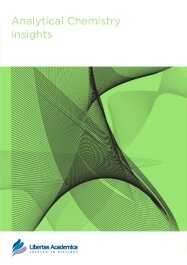

Publication Date: 30 Jul 2012
Type: Original Research
Journal: Analytical Chemistry Insights
Citation: Analytical Chemistry Insights 2012:7 31-46
doi: 10.4137/ACI.S9940

A novel, quick, reliable and simple capillary zone electrophoresis CZE method was developed and validated for the simultaneous determination of sitagliptin (SG) and metformin (MF) in pharmaceutical preparations. Separation was carried out in fused silica capillary (50.0 cm total length and 43.0 cm effective length, 49 µm i.d.) by applying a potential of 15 KV (positive polarity) and a running buffer containing 60 mM phosphate buffer at pH 4.0 with UV detection at 203 nm. The samples were injected hydrodynamically for 3 s at 0.5 psi and the temperature of the capillary cartridge was kept at 25 °C. Phenformin was used as internal standard (IS).
The method was suitably validated with respect to specificity, linearity, limit of detection and quantitation, accuracy, precision, and robustness. The method showed good linearity in the ranges of 10–100 µg/mL and 50–500 µg/mL with limits of detection of 0.49, 2.11 µg/mL and limits of quantification of 1.48, 6.39 µg/mL for SG and MF, respectively. The proposed method was successfully applied for the analysis of the studied drugs in their synthetic mixtures and co-formulated tablets without interfering peaks due to the excipients present in the pharmaceutical tablets. The method was further extended to the in-vitro determination of the two drugs in spiked human plasma. The estimated amounts of SG/MF were almost identical with the certified values, and their percentage relative standard deviation values (% R.S.D.) were found to be ≤1.50% (n = 3). The results were compared to a reference method reported in the literature and no significant difference was found statistically.
PDF (721.81 KB PDF FORMAT)
RIS citation (ENDNOTE, REFERENCE MANAGER, PROCITE, REFWORKS)
BibTex citation (BIBDESK, LATEX)
XML
PMC HTML


I have published more than thirty research papers in internationally reputed high impact factor journals including Libertas Academica publications, Proteomics Insights and Analytical Chemistry Insights. I have no hesitation in saying that Proteomics Insights is highly efficient for its rapid and high quality review process and keeping the authors informed at each stage of the publication process. I recommend this journal for students, teachers and research workers who wish to publish their work. ...
Facebook Google+ Twitter
Pinterest Tumblr YouTube